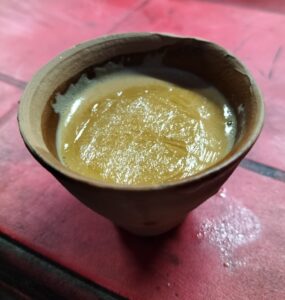
This is a reflection on two of the lectionary readings for ‘Proper 4’: Psalm 139 and 2 Corinthians 4:5-12. With inspiration from Richard Rohr’s Falling Upward.
At the beginning of last year, my better half and I spent three months in a large city in Northern India. This was an extraordinary experience of the sights, sounds and smells of a very different way of life to what we had been used to in quiet, orderly, rural Switzerland. A particularly strong memory was of a trip I took with some work colleagues to visit a field hospital in a remote village. On the way there, in the dead of night, we took a pit-stop for a cup of something hot. Now, I like my tea weak with very little milk, no sugar, and generally not messed about with. The chai I was given was strong, milky, spicy and unbearably sweet; but the most memorable thing about it was the strong taste of mud! This chai was served in small, unglazed, clay cups, which dissolved slightly imparting an unmistakeable flavour to the tea. These clay cups are disposable, they are formed from the clay of the ground, baked, used once, and then thrown back to the ground. It was to these basic and functional clay vessels that my mind turned when I read our passage from 2 Corinthians today.
Some members of the church in Corinth had been arguing that Paul had suffered too much to be a genuine apostle, and so he partly wrote this letter to emphasize that God was using Paul’s suffering to reveal God’s glory. Paul describes himself as a slave to the church for the sake of God’s glory and that he was nothing but a clay jar. He goes on to say that that we all have this treasure of God’s glory in the clay jars of our lives. Paul’s attitude appears extremely self-effacing.
But let’s pause our thoughts about the clay jars for now and go on to look at today’s Psalm. We had a truncated version read to us, and I do recommend that you read the full text, as it is a beautiful description of God’s intimate love for each one of us. It talks of how God pursues us, searches us out wherever we are, hems us in, and won’t let us go. Of how he knows us, how he watched over us being knitted together in the womb. How we are precious and valuable, unconditionally loved from before even the first amino acids of our nascent being were joined together.
At first glance, these two images appear to be in conflict. How can we be, at one and the same time, both so precious and so mundane? Do our lives matter in themselves, or are we just a vehicle to be used by God?
On further reflection, I think we can hold these two images in tension, but we need to give them different emphases at different points in our lives. Franciscan theologian Richard Rohr talks about the two halves of life. The first half of life is all about building up our ego, succeeding in our projects, discovering who we are and becoming confident in that. This sounds rather like the nurturing emphasis of Psalm 139. He calls it ‘building the container’ and sees it is a necessary part of spiritual development. But at some point, there comes a crisis – a moment of great failure or loss, or even of great love – that breaks through the ego we have built up and brings us to a new place of awareness. Here we start to see that the point of the container of our lives is to hold something bigger, so we can start to let go of our ego and let God be God in us without needing to succeed, achieve or prove a point. This second half of life sounds rather like Paul’s jars of clay, when we know that the jar isn’t the important thing – it’s all about the treasure within.
But this does come with a health warning. We need to come to 2 Cor 4 from a position of security, value and love. If we skip over Psalm 139, we miss out on the first half of life work of building up a healthy personhood. If we try to go straight to the clay jar, we risk ending up seeing ourselves as worthless, unimportant and even unlovable. We will have problems with setting healthy boundaries and caring for ourselves as much as we care for other people. But if we can put these two pictures together, we end up being so deeply secure in the unconditional love of God that we are free to let go of our own desire for approval, admiration or affirmation. We are liberated to be clay jars full of the treasure of God’s glory as a gift to the world.
There is so much to say about this image of clay jars. I hope it isn’t stretching things too far to compare the Indian teacups flavouring the tea with the way that each of us makes God visible in a slightly different way. We are not uniform, passive containers, who could easily be replaced by anyone else; each one of us expresses something unique of the nature of God, and as Psalm 139 tells us, and unlike the Indian teacups, each one of us has been made with great care and attention. And yet, the cup isn’t the point, it’s the tea that matters. Genesis tells us that Adam was made from the earth and the funeral service reminds us that to the earth our bodies will return. Like the clay teacups, we are formed out of the earth for a while, designed to hold something precious and then destined to return to the earth.
Clay jars are not particularly beautiful, and even as we grow emotionally and spiritually, our weakness and failures remain obvious to the people close to us, and hopefully also to ourselves. The paradox of our own failings and the glory of God coexisting within us is the reality of human existence. We all bear wounds, and God uses these to form us for our path in life. We see this in the life of Paul, who went from being arch-persecutor of the fledgling church to its greatest evangelist; God took someone with enormous zeal for what he misguidedly thought was the truth and redirected it for good. Perhaps the extreme nature of his personality well-suited Paul to the life of adventure, danger and suffering that bore the fruit of much of the New Testament and the expansion of the early church.
But we get indications here and there that Paul was not an easy character to deal with. There were conflicts with Barnabus and with Peter that perhaps could have been dealt with better, and he can sometimes come across as taking himself a bit too seriously. Really this shouldn’t surprise us, we all have a shadow side we need to face up to; for our shadow becomes problematic when we pretend it isn’t there, and it can come out in ugly ways, as in the various scandals that have rocked Christian churches in recent times.
God said ‘Let light shine out of darkness’ and indeed, light is most obvious when it illuminates a dark place. The light of Christ is shining in our hearts, we can see it in each other, even when we can’t see it in ourselves, and, in the strange economy of God, it coexists with the very things that make us difficult to live with! Elsewhere in this letter (12:9) Paul writes that God told him ‘My grace is sufficient for you, for power is made perfect in weakness’; we can’t generate the light, we can only receive it, and that’s actually easier when we are vulnerable, wounded, and aware of our flaws, these are the places where God can most easily get in and do his work.
But this transformation isn’t for our benefit. Paul reminds us where to put our focus ‘For we do not proclaim ourselves; we proclaim Jesus Christ as Lord and ourselves as your slaves for Jesus’ sake.’ We are not to promote ourselves, or even our precious church community; our focus is to be on Christ. As a church community our purpose is to glorify, worship, and reveal Christ to the world.
Our church is like one of Paul’s clay jars; I invite you to prayerfully consider how you might contribute to strengthening it – not for its own sake, but for the sake of the treasure it holds for the glory of God in the face of Jesus Christ. Amen.
